人教版(2019)必修第一册Unit 3 Sports and Fitness Discovering Useful Structures 课件(共33张PPT)
文档属性
| 名称 | 人教版(2019)必修第一册Unit 3 Sports and Fitness Discovering Useful Structures 课件(共33张PPT) | 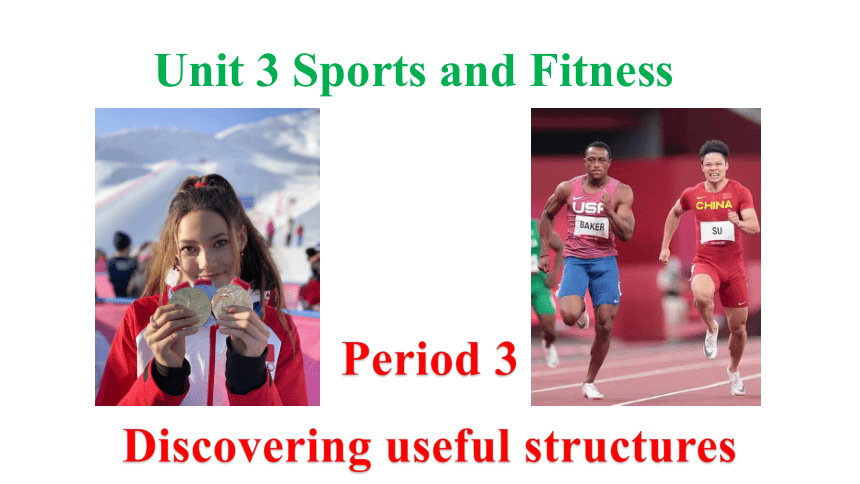 | |
| 格式 | pptx | ||
| 文件大小 | 2.4MB | ||
| 资源类型 | 教案 | ||
| 版本资源 | 人教版(2019) | ||
| 科目 | 英语 | ||
| 更新时间 | 2023-11-22 12:27:38 | ||
图片预览

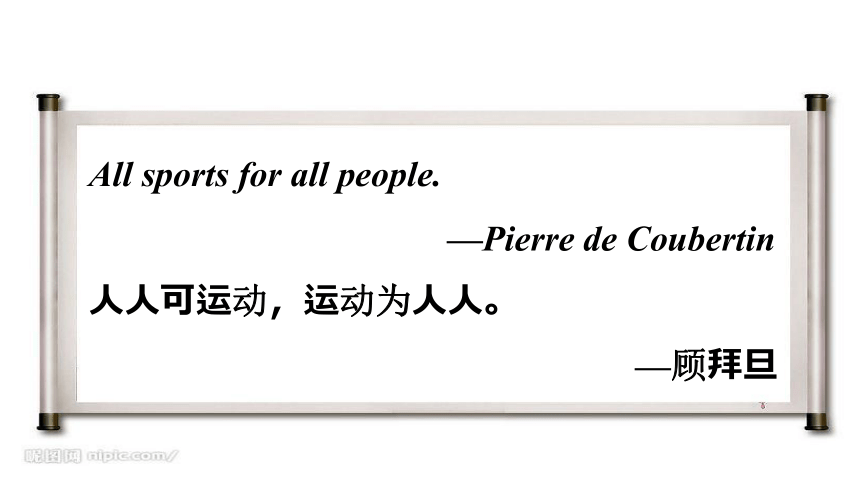
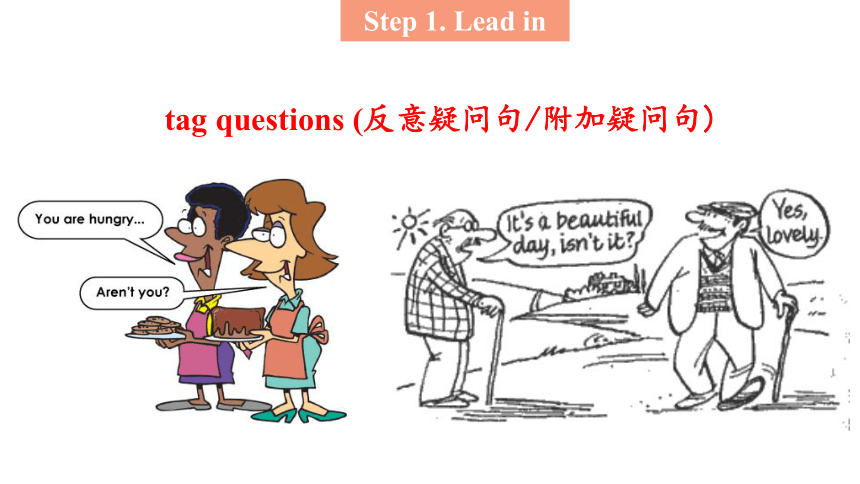
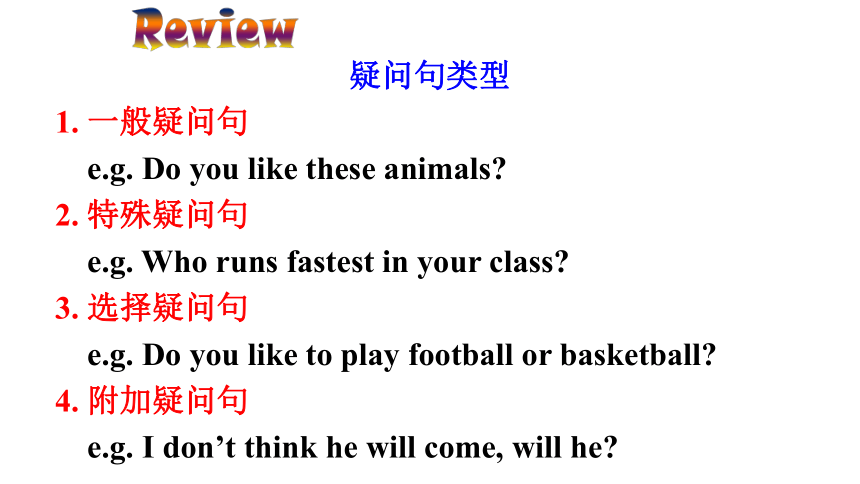
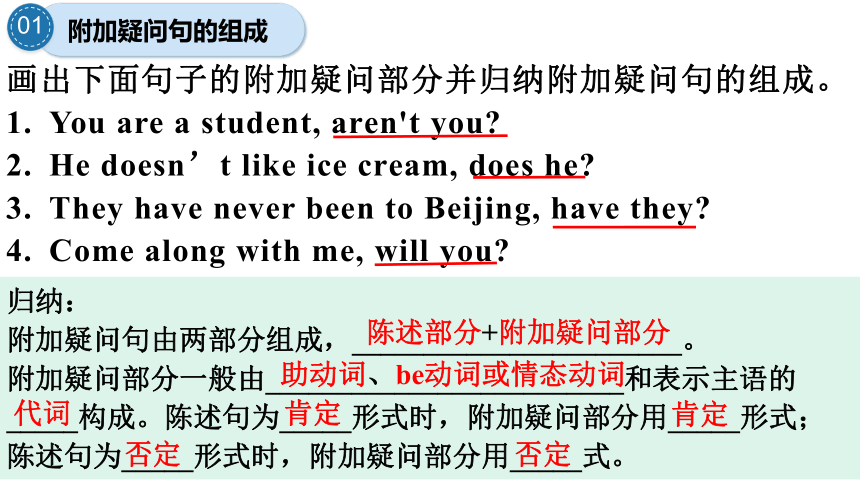
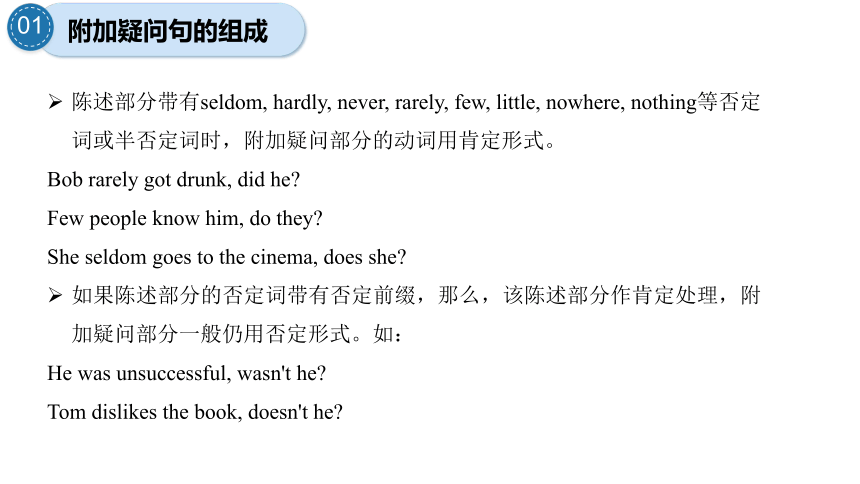
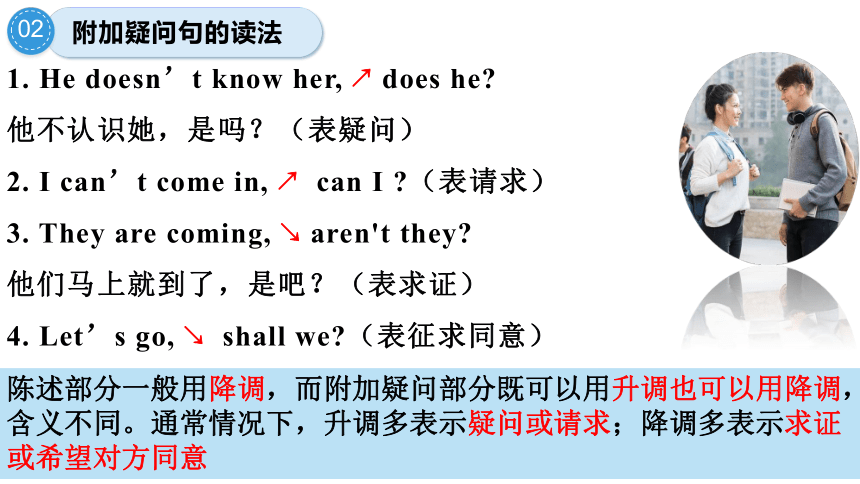
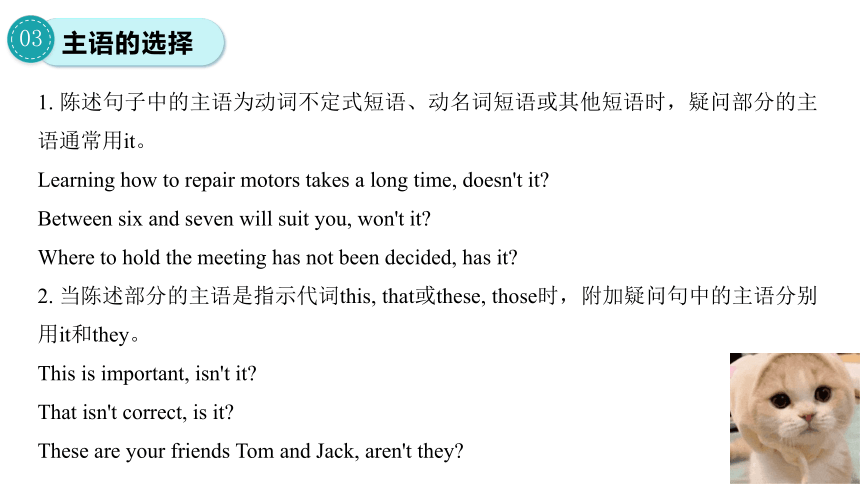
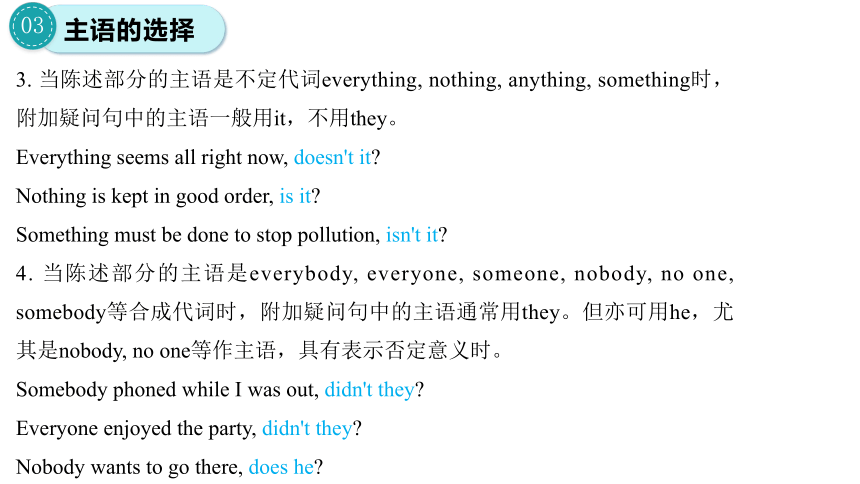
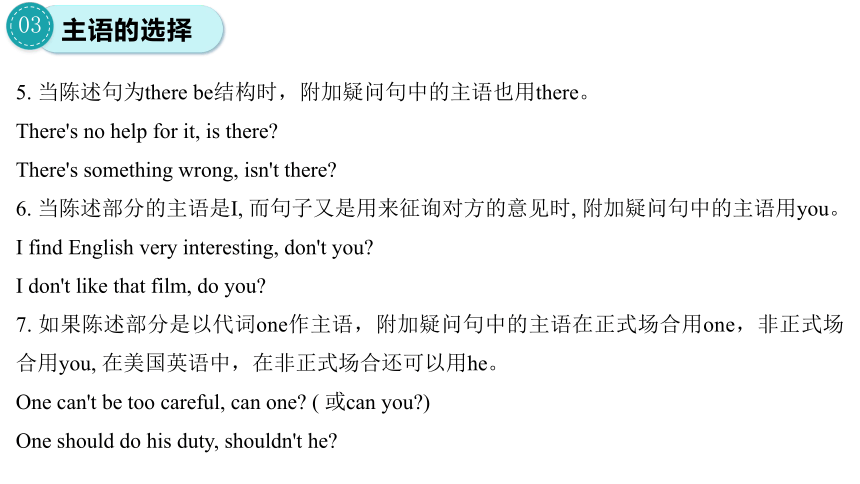
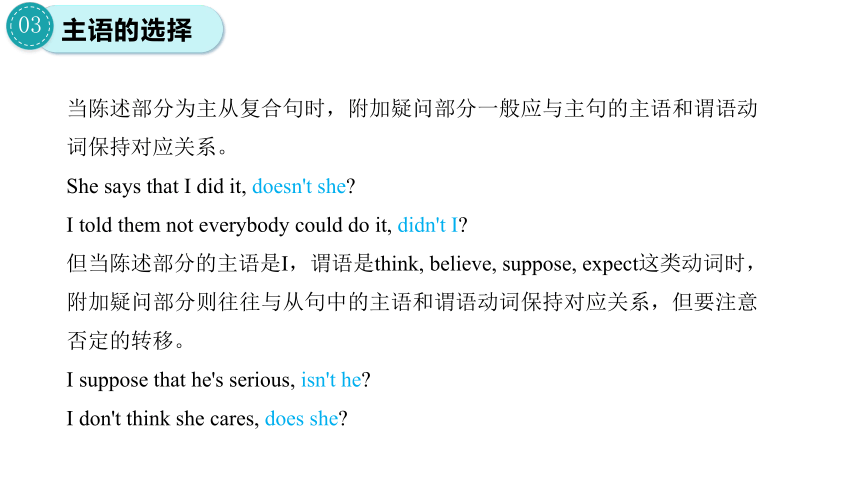
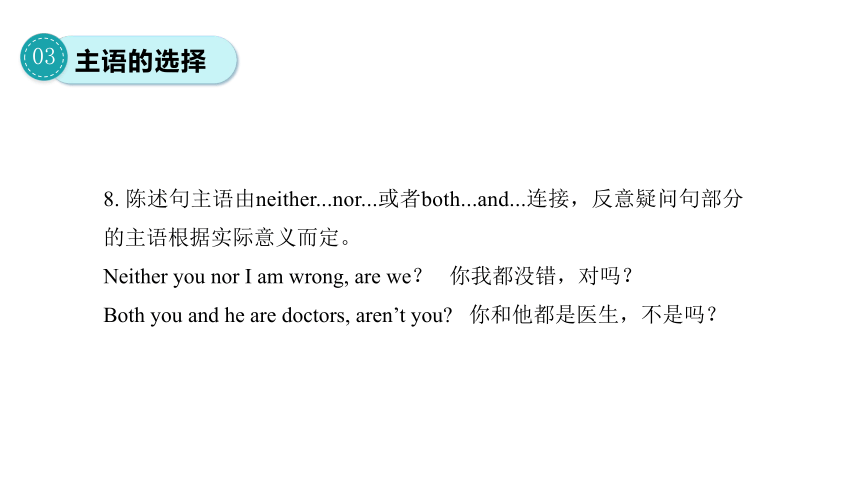
文档简介
(共33张PPT)
Unit 3 Sports and Fitness
Period 3
Discovering useful structures
All sports for all people.
—Pierre de Coubertin
人人可运动,运动为人人。
—顾拜旦
tag questions (反意疑问句/附加疑问句)
Step 1. Lead in
疑问句类型
一般疑问句
e.g. Do you like these animals
2. 特殊疑问句
e.g. Who runs fastest in your class
3. 选择疑问句
e.g. Do you like to play football or basketball
4. 附加疑问句
e.g. I don’t think he will come, will he
画出下面句子的附加疑问部分并归纳附加疑问句的组成。
You are a student, aren't you
He doesn’t like ice cream, does he
They have never been to Beijing, have they
Come along with me, will you
归纳:
附加疑问句由两部分组成,_______________________。
附加疑问部分一般由_________________________和表示主语的_____构成。陈述句为_____形式时,附加疑问部分用_____形式;陈述句为_____形式时,附加疑问部分用_____式。
陈述部分+附加疑问部分
助动词、be动词或情态动词
代词
肯定
肯定
否定
否定
01
附加疑问句的组成
01
附加疑问句的组成
陈述部分带有seldom, hardly, never, rarely, few, little, nowhere, nothing等否定词或半否定词时,附加疑问部分的动词用肯定形式。
Bob rarely got drunk, did he
Few people know him, do they
She seldom goes to the cinema, does she
如果陈述部分的否定词带有否定前缀,那么,该陈述部分作肯定处理,附加疑问部分一般仍用否定形式。如:
He was unsuccessful, wasn't he
Tom dislikes the book, doesn't he
1. He doesn’t know her, ↗does he
他不认识她,是吗?(表疑问)
2. I can’t come in, ↗ can I (表请求)
3. They are coming, ↘aren't they
他们马上就到了,是吧?(表求证)
4. Let’s go, ↘ shall we (表征求同意)
陈述部分一般用降调,而附加疑问部分既可以用升调也可以用降调,含义不同。通常情况下,升调多表示疑问或请求;降调多表示求证或希望对方同意
02
附加疑问句的读法
1. 陈述句子中的主语为动词不定式短语、动名词短语或其他短语时,疑问部分的主语通常用it。
Learning how to repair motors takes a long time, doesn't it
Between six and seven will suit you, won't it
Where to hold the meeting has not been decided, has it
2. 当陈述部分的主语是指示代词this, that或these, those时,附加疑问句中的主语分别用it和they。
This is important, isn't it
That isn't correct, is it
These are your friends Tom and Jack, aren't they
03
主语的选择
3. 当陈述部分的主语是不定代词everything, nothing, anything, something时,附加疑问句中的主语一般用it,不用they。
Everything seems all right now, doesn't it
Nothing is kept in good order, is it
Something must be done to stop pollution, isn't it
4. 当陈述部分的主语是everybody, everyone, someone, nobody, no one, somebody等合成代词时,附加疑问句中的主语通常用they。但亦可用he,尤其是nobody, no one等作主语,具有表示否定意义时。
Somebody phoned while I was out, didn't they
Everyone enjoyed the party, didn't they
Nobody wants to go there, does he
03
主语的选择
5. 当陈述句为there be结构时,附加疑问句中的主语也用there。
There's no help for it, is there
There's something wrong, isn't there
6. 当陈述部分的主语是I, 而句子又是用来征询对方的意见时, 附加疑问句中的主语用you。
I find English very interesting, don't you
I don't like that film, do you
7. 如果陈述部分是以代词one作主语,附加疑问句中的主语在正式场合用one,非正式场合用you, 在美国英语中,在非正式场合还可以用he。
One can't be too careful, can one ( 或can you )
One should do his duty, shouldn't he
03
主语的选择
当陈述部分为主从复合句时,附加疑问部分一般应与主句的主语和谓语动词保持对应关系。
She says that I did it, doesn't she
I told them not everybody could do it, didn't I
但当陈述部分的主语是I,谓语是think, believe, suppose, expect这类动词时,附加疑问部分则往往与从句中的主语和谓语动词保持对应关系,但要注意否定的转移。
I suppose that he's serious, isn't he
I don't think she cares, does she
03
主语的选择
03
主语的选择
8. 陈述句主语由neither...nor...或者both...and...连接,反意疑问句部分的主语根据实际意义而定。
Neither you nor I am wrong, are we? 你我都没错,对吗?
Both you and he are doctors, aren’t you 你和他都是医生,不是吗?
1. 含have/has附加疑问句
当have 为助动词时,附加疑问句用同样的助动词。
The sheep has already arrived, hasn’t he
若表示“所有”,附加疑问句可以用have,也可以用do;但是若陈述句部分用的是have的否定式,附加疑问句用have还是用do, 取决于陈述部分的动词形式。
You have a new bike, haven't/don't you
She doesn't have any money in her pocket, does she
若表示“吃,玩”等意思,附加疑问句要用do。
He has a great time at the sports meeting, doesn’t he
04
谓语的选择
2.含情态动词附加疑问句
陈述句的谓语动词是情态动词have(has)to(必须)时,疑问部分用do的相应形式。
They have to go there, don’t they? He has to leave early, doesn’t he?
陈述句含情态动词,疑问句重复同样情态动词。
We should cheer her on, shouldn't we
若must表推测这层含义时,不能用must,而要根据陈述部分的不定式结构(即must之后的动词)以及含义采用相应的动词形式。must have done 对过去情况推测,若强调动作的完成 (没有时间状语) 疑问部分用haven‘t/hasn’t +主语。若强调对过去情况的推测 (一般有过去时间状语), 疑问部分用didn't +主语。
You must have made a mistake, haven't you
They must have seen the film last week, didn't they
He must be in the library, isn't he
04
谓语的选择
2.含情态动词附加疑问句
当陈述部分带有情态动词must表示“必须” “有必要”时,疑问部分用mustn’t/needn’t; 若陈述部分有mustn’t表示“禁止”,疑问部分用must.
You must work hard next term, mustn't you
I must answer the letter, mustn't I
当陈述部分含有情态动词used to时,疑问部分可用usedn't 或didn't。
The old man used to smoke, didn't/usedn't he
Tom used to live here, usedn't/didn't he
当陈述部分带有情态动词ought to时,疑问部分用oughtn't或shouldn't。
He ought to know the answer, oughtn't he
We ought to read this book, oughtn't/shouldn't we
04
谓语的选择
3.含祈使句的附加疑问句
肯定的祈使句的附加问句可用will you或won’t you, 否定的祈使句的附加问句用will you.
Listen to me carefully, will/won’t you
Don’t play with fire, will you
Don't do that again, will you
Go with me, will you / won't you
但是,以let’s开头的祈使句,附加疑问部分用shall we;以let us开头的祈使句,如果含义是allow us,不包括听话人在内,疑问部分用will you。
Let's have a basketball match this afternoon, shall we
Let us go out for a rest, will you
04
谓语的选择
陈述句中的谓语动词是wish,表示愿望时用may,且用肯定形式。
I wish to have a chance to learn English, may I
当陈述部分含有had better时,疑问部分用had。
如:You'd better finish your homework now, hadn't you
当陈述部分是并列句,附加疑问句则需和就近的分句的主语和谓语保持一致。
Xiao Lin has been writing letters all afternoon but he should finish them now, shouldn't he
感叹句后的附加疑问句的谓语动词需用be的现在时,且常用否定形式。
What a clever boy, isn't he
What a lovely day, isn't it
05
特殊情况
You finished your homework,
One can’t always be perfect,
Everything is ready,
Everyone should be on time,
What he said isn’t true,
She dislikes sports,
There was a mountain,
didn't you
can one/he
isn’t it
shouldn’t they
is it
doesn’t she
wasn’t there
完成下列反意疑问句
附加疑问句的答语与一般疑问句类似,注意其与汉语表达习惯的差异。
事实是肯定的用yes+肯定结构,反之用no+否定结构。
但在前否后肯的结构中,yes表示“不”,no表示“是”。
如: — They work hard, don’t they
— Yes, they do./ No, they don’t.
是的,他们工作努力。/ 不,他们工作不努力。
— They don’t work hard, do they
— Yes, they do./ No, they don’t.
不,他们工作努力。/ 是的,他们工作不努力。
05
反义疑问句的回答
I. 用反意疑问句补全句子。
1. No one wants to leave, ________
2. You must read more books next term, ___________
3. Let’s talk about your son now, _________
4. I don’t think you’ve heard of this concept
before, __________
do they
mustn’t you
shall we
have you
5. People should make the best of what
they’ve learnt, ______________
6. There have been some terrible scenes on
television, ______________
shouldn’t they
haven’t there
7. She seldom goes to the cinema, __________
8. You won't be away for long,________
9. You've already got our invitation, ____________
10. — Your uncle told me that he overslept.
— Oh, my uncle rarely used to oversleep, _________
11. We never dared to ask him a question, __________
12. The old lady scarcely cares for anything, _________
did we
does she
will you
haven't you
did he
does she
完成下列反意疑问句
1. It’s a fine day. Let’s go for a picnic, _______
2. Eason is late again. This is the third time
this week he’s been late, ______
shall we
isn’t it
3. —Daddy’s forgot to prepare a Christmas tree, ________
—I’m afraid he has.
4. —Sorry, I’m not feeling well and I don’t think I can finish.
—Don’t worry. Let us do it for you, _______
hasn’t he
will you
5. I don’t think he could have cheated in the exam, ______
6. —The ground is wet.
—It must have rained last night, _______
7. —Donna doesn’t think that Michael is generous, ________
—I’m afraid not.
did he
didn’t it
does she
8. —The new house need cleaning.
—Well, let’s clean it together, _______
9. There is little we can do about it, _______
10. —The problem wasn’t difficult for him, _____
—No, it wasn’t. He should have been given a more
difficult one.
shall we
is there
was it
II. 用恰当的反意疑问句补全下面对话。
Host: You’ve lived in Hollywood for many years, ___________
Guest: Since I was eighteen and came here to write my first screenplay.
Host: You didn’t know anyone here at first,__________
Guest: No. And I didn’t have a cent to my name.Just some ideas and a lot of hope. It sounds crazy, ________
haven’t you
did you
doesn’t it
Host: But things have worked out for you,__________ You’re working on another screenplay now, ___________
Guest: Yes. It's a comedy about some kids who become invisible.
Host: Speaking of kids, you have some of yourown, ________________
Guest: Two boys and a girl — all very visible!
Host: I know what you mean. Do you ever wish they were invisible
Guest: Now, that’s an interesting thought, ___________
haven’t they
aren’t you
don’t / haven’t you
isn’t it
三、句子改错。
1. You never told us why you were late for the last meeting. didn't you
2. The doctor soon had the patient walking again, hadn't he
3. Everything seems all right, isn't it
4. There won’t be any concert this Saturday evening, will it
5. Let’s go shopping, will you
6. —They don’t work hard, do they
—Yes, they do. They are very lazy.
did you
didn't he
doesn't it
will there
shall we
No, they don't.
Complete the conversations with appropriate tag questions or correct answers. Then act them out.
1. A: It’s not going to rain, is it
B: __________. It’s a good day for sports.
A: Then we can play football, ________
B: ___________. We don’t have a ball.
No, it isn’t
can’t we
No, we can’t
2. A: It’s Sports Day next Thursday, _______
B: You’re right, it is. Let’s ask Xia Lei if she wants to join a team.
A: She likes soccer, __________
B: ______________. But she loves volleyball. She could be in the volleyball team.
isn’t it
doesn’t she
No, she doesn’t
3. A: It’s time for badminton class. Where is the coach He’s late, _______
B: It’s been 10 minutes already. He isn’t coming, _____
A: Cool! We can have a good time. That’s great!
B: Shh!
A: Oh no, he’s right behind me, ______
C: Yes, I am!
isn’t he
is he
isn’t he
Use tag questions to role-play one of the situations below.
Review grammar.
Make a conversation according to Activity 3 on page 40.
Thank you
Unit 3 Sports and Fitness
Period 3
Discovering useful structures
All sports for all people.
—Pierre de Coubertin
人人可运动,运动为人人。
—顾拜旦
tag questions (反意疑问句/附加疑问句)
Step 1. Lead in
疑问句类型
一般疑问句
e.g. Do you like these animals
2. 特殊疑问句
e.g. Who runs fastest in your class
3. 选择疑问句
e.g. Do you like to play football or basketball
4. 附加疑问句
e.g. I don’t think he will come, will he
画出下面句子的附加疑问部分并归纳附加疑问句的组成。
You are a student, aren't you
He doesn’t like ice cream, does he
They have never been to Beijing, have they
Come along with me, will you
归纳:
附加疑问句由两部分组成,_______________________。
附加疑问部分一般由_________________________和表示主语的_____构成。陈述句为_____形式时,附加疑问部分用_____形式;陈述句为_____形式时,附加疑问部分用_____式。
陈述部分+附加疑问部分
助动词、be动词或情态动词
代词
肯定
肯定
否定
否定
01
附加疑问句的组成
01
附加疑问句的组成
陈述部分带有seldom, hardly, never, rarely, few, little, nowhere, nothing等否定词或半否定词时,附加疑问部分的动词用肯定形式。
Bob rarely got drunk, did he
Few people know him, do they
She seldom goes to the cinema, does she
如果陈述部分的否定词带有否定前缀,那么,该陈述部分作肯定处理,附加疑问部分一般仍用否定形式。如:
He was unsuccessful, wasn't he
Tom dislikes the book, doesn't he
1. He doesn’t know her, ↗does he
他不认识她,是吗?(表疑问)
2. I can’t come in, ↗ can I (表请求)
3. They are coming, ↘aren't they
他们马上就到了,是吧?(表求证)
4. Let’s go, ↘ shall we (表征求同意)
陈述部分一般用降调,而附加疑问部分既可以用升调也可以用降调,含义不同。通常情况下,升调多表示疑问或请求;降调多表示求证或希望对方同意
02
附加疑问句的读法
1. 陈述句子中的主语为动词不定式短语、动名词短语或其他短语时,疑问部分的主语通常用it。
Learning how to repair motors takes a long time, doesn't it
Between six and seven will suit you, won't it
Where to hold the meeting has not been decided, has it
2. 当陈述部分的主语是指示代词this, that或these, those时,附加疑问句中的主语分别用it和they。
This is important, isn't it
That isn't correct, is it
These are your friends Tom and Jack, aren't they
03
主语的选择
3. 当陈述部分的主语是不定代词everything, nothing, anything, something时,附加疑问句中的主语一般用it,不用they。
Everything seems all right now, doesn't it
Nothing is kept in good order, is it
Something must be done to stop pollution, isn't it
4. 当陈述部分的主语是everybody, everyone, someone, nobody, no one, somebody等合成代词时,附加疑问句中的主语通常用they。但亦可用he,尤其是nobody, no one等作主语,具有表示否定意义时。
Somebody phoned while I was out, didn't they
Everyone enjoyed the party, didn't they
Nobody wants to go there, does he
03
主语的选择
5. 当陈述句为there be结构时,附加疑问句中的主语也用there。
There's no help for it, is there
There's something wrong, isn't there
6. 当陈述部分的主语是I, 而句子又是用来征询对方的意见时, 附加疑问句中的主语用you。
I find English very interesting, don't you
I don't like that film, do you
7. 如果陈述部分是以代词one作主语,附加疑问句中的主语在正式场合用one,非正式场合用you, 在美国英语中,在非正式场合还可以用he。
One can't be too careful, can one ( 或can you )
One should do his duty, shouldn't he
03
主语的选择
当陈述部分为主从复合句时,附加疑问部分一般应与主句的主语和谓语动词保持对应关系。
She says that I did it, doesn't she
I told them not everybody could do it, didn't I
但当陈述部分的主语是I,谓语是think, believe, suppose, expect这类动词时,附加疑问部分则往往与从句中的主语和谓语动词保持对应关系,但要注意否定的转移。
I suppose that he's serious, isn't he
I don't think she cares, does she
03
主语的选择
03
主语的选择
8. 陈述句主语由neither...nor...或者both...and...连接,反意疑问句部分的主语根据实际意义而定。
Neither you nor I am wrong, are we? 你我都没错,对吗?
Both you and he are doctors, aren’t you 你和他都是医生,不是吗?
1. 含have/has附加疑问句
当have 为助动词时,附加疑问句用同样的助动词。
The sheep has already arrived, hasn’t he
若表示“所有”,附加疑问句可以用have,也可以用do;但是若陈述句部分用的是have的否定式,附加疑问句用have还是用do, 取决于陈述部分的动词形式。
You have a new bike, haven't/don't you
She doesn't have any money in her pocket, does she
若表示“吃,玩”等意思,附加疑问句要用do。
He has a great time at the sports meeting, doesn’t he
04
谓语的选择
2.含情态动词附加疑问句
陈述句的谓语动词是情态动词have(has)to(必须)时,疑问部分用do的相应形式。
They have to go there, don’t they? He has to leave early, doesn’t he?
陈述句含情态动词,疑问句重复同样情态动词。
We should cheer her on, shouldn't we
若must表推测这层含义时,不能用must,而要根据陈述部分的不定式结构(即must之后的动词)以及含义采用相应的动词形式。must have done 对过去情况推测,若强调动作的完成 (没有时间状语) 疑问部分用haven‘t/hasn’t +主语。若强调对过去情况的推测 (一般有过去时间状语), 疑问部分用didn't +主语。
You must have made a mistake, haven't you
They must have seen the film last week, didn't they
He must be in the library, isn't he
04
谓语的选择
2.含情态动词附加疑问句
当陈述部分带有情态动词must表示“必须” “有必要”时,疑问部分用mustn’t/needn’t; 若陈述部分有mustn’t表示“禁止”,疑问部分用must.
You must work hard next term, mustn't you
I must answer the letter, mustn't I
当陈述部分含有情态动词used to时,疑问部分可用usedn't 或didn't。
The old man used to smoke, didn't/usedn't he
Tom used to live here, usedn't/didn't he
当陈述部分带有情态动词ought to时,疑问部分用oughtn't或shouldn't。
He ought to know the answer, oughtn't he
We ought to read this book, oughtn't/shouldn't we
04
谓语的选择
3.含祈使句的附加疑问句
肯定的祈使句的附加问句可用will you或won’t you, 否定的祈使句的附加问句用will you.
Listen to me carefully, will/won’t you
Don’t play with fire, will you
Don't do that again, will you
Go with me, will you / won't you
但是,以let’s开头的祈使句,附加疑问部分用shall we;以let us开头的祈使句,如果含义是allow us,不包括听话人在内,疑问部分用will you。
Let's have a basketball match this afternoon, shall we
Let us go out for a rest, will you
04
谓语的选择
陈述句中的谓语动词是wish,表示愿望时用may,且用肯定形式。
I wish to have a chance to learn English, may I
当陈述部分含有had better时,疑问部分用had。
如:You'd better finish your homework now, hadn't you
当陈述部分是并列句,附加疑问句则需和就近的分句的主语和谓语保持一致。
Xiao Lin has been writing letters all afternoon but he should finish them now, shouldn't he
感叹句后的附加疑问句的谓语动词需用be的现在时,且常用否定形式。
What a clever boy, isn't he
What a lovely day, isn't it
05
特殊情况
You finished your homework,
One can’t always be perfect,
Everything is ready,
Everyone should be on time,
What he said isn’t true,
She dislikes sports,
There was a mountain,
didn't you
can one/he
isn’t it
shouldn’t they
is it
doesn’t she
wasn’t there
完成下列反意疑问句
附加疑问句的答语与一般疑问句类似,注意其与汉语表达习惯的差异。
事实是肯定的用yes+肯定结构,反之用no+否定结构。
但在前否后肯的结构中,yes表示“不”,no表示“是”。
如: — They work hard, don’t they
— Yes, they do./ No, they don’t.
是的,他们工作努力。/ 不,他们工作不努力。
— They don’t work hard, do they
— Yes, they do./ No, they don’t.
不,他们工作努力。/ 是的,他们工作不努力。
05
反义疑问句的回答
I. 用反意疑问句补全句子。
1. No one wants to leave, ________
2. You must read more books next term, ___________
3. Let’s talk about your son now, _________
4. I don’t think you’ve heard of this concept
before, __________
do they
mustn’t you
shall we
have you
5. People should make the best of what
they’ve learnt, ______________
6. There have been some terrible scenes on
television, ______________
shouldn’t they
haven’t there
7. She seldom goes to the cinema, __________
8. You won't be away for long,________
9. You've already got our invitation, ____________
10. — Your uncle told me that he overslept.
— Oh, my uncle rarely used to oversleep, _________
11. We never dared to ask him a question, __________
12. The old lady scarcely cares for anything, _________
did we
does she
will you
haven't you
did he
does she
完成下列反意疑问句
1. It’s a fine day. Let’s go for a picnic, _______
2. Eason is late again. This is the third time
this week he’s been late, ______
shall we
isn’t it
3. —Daddy’s forgot to prepare a Christmas tree, ________
—I’m afraid he has.
4. —Sorry, I’m not feeling well and I don’t think I can finish.
—Don’t worry. Let us do it for you, _______
hasn’t he
will you
5. I don’t think he could have cheated in the exam, ______
6. —The ground is wet.
—It must have rained last night, _______
7. —Donna doesn’t think that Michael is generous, ________
—I’m afraid not.
did he
didn’t it
does she
8. —The new house need cleaning.
—Well, let’s clean it together, _______
9. There is little we can do about it, _______
10. —The problem wasn’t difficult for him, _____
—No, it wasn’t. He should have been given a more
difficult one.
shall we
is there
was it
II. 用恰当的反意疑问句补全下面对话。
Host: You’ve lived in Hollywood for many years, ___________
Guest: Since I was eighteen and came here to write my first screenplay.
Host: You didn’t know anyone here at first,__________
Guest: No. And I didn’t have a cent to my name.Just some ideas and a lot of hope. It sounds crazy, ________
haven’t you
did you
doesn’t it
Host: But things have worked out for you,__________ You’re working on another screenplay now, ___________
Guest: Yes. It's a comedy about some kids who become invisible.
Host: Speaking of kids, you have some of yourown, ________________
Guest: Two boys and a girl — all very visible!
Host: I know what you mean. Do you ever wish they were invisible
Guest: Now, that’s an interesting thought, ___________
haven’t they
aren’t you
don’t / haven’t you
isn’t it
三、句子改错。
1. You never told us why you were late for the last meeting. didn't you
2. The doctor soon had the patient walking again, hadn't he
3. Everything seems all right, isn't it
4. There won’t be any concert this Saturday evening, will it
5. Let’s go shopping, will you
6. —They don’t work hard, do they
—Yes, they do. They are very lazy.
did you
didn't he
doesn't it
will there
shall we
No, they don't.
Complete the conversations with appropriate tag questions or correct answers. Then act them out.
1. A: It’s not going to rain, is it
B: __________. It’s a good day for sports.
A: Then we can play football, ________
B: ___________. We don’t have a ball.
No, it isn’t
can’t we
No, we can’t
2. A: It’s Sports Day next Thursday, _______
B: You’re right, it is. Let’s ask Xia Lei if she wants to join a team.
A: She likes soccer, __________
B: ______________. But she loves volleyball. She could be in the volleyball team.
isn’t it
doesn’t she
No, she doesn’t
3. A: It’s time for badminton class. Where is the coach He’s late, _______
B: It’s been 10 minutes already. He isn’t coming, _____
A: Cool! We can have a good time. That’s great!
B: Shh!
A: Oh no, he’s right behind me, ______
C: Yes, I am!
isn’t he
is he
isn’t he
Use tag questions to role-play one of the situations below.
Review grammar.
Make a conversation according to Activity 3 on page 40.
Thank you
